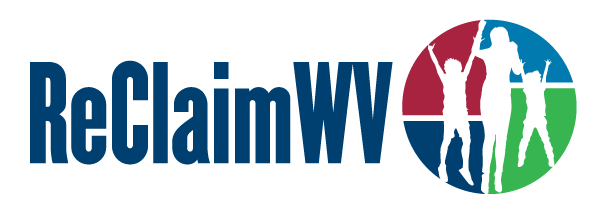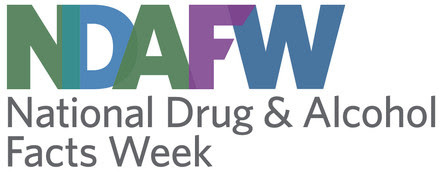Schools and Educators
"WV public schools must take a stance on drug prevention to ensure students are health literate and understand the poor health, academic and economic outcomes with drug use/abuse. House Bill 2195 which must be implemented in public schools no later than the 2018-19 school year requires school-based K-12 comprehensive drug awareness and prevention programs. Schools already teach the standards in health education, work with the community to do drug prevention and awareness programs and refer students to mental health services as needed."
Learn more about WVDE substance abuse prevention efforts
ReClaimWV
ReClaimWV is West Virginia Department of Education’s response to the opioid epidemic through support and collaboration with local education agencies, schools, communities, and families to address the social-emotional, physical, behavioral, and mental health needs of our students.
Click here to learn more!
Project AWARE:
WV-AWARE's purpose is to increase awareness of the mental health issues throughout the state by training school personnel and other adults who interact with school-aged youth on how to detect, respond and connect children and families who may have mental health issues with the appropriate services.
Learn More: https://wvde.us/student-support-well-being/project-aware/
What is the role of schools?
- School leaders, teachers and staff can create safe environments and positive cultures for students.
- They can educate students, each other and families about the dangers of drug use and about how to prevent opioid misuse and addiction.
- Many evidence-based prevention programs can be delivered in a school setting.
- Schools can help to mitigate risk factors that can make students vulnerable to engaging in dangerous behavior.
- They can also boost protective factors and increase student engagement.
- Schools can be prepared if an opioid overdose occurs on school grounds.
- Schools and school districts can support students in recovery and students whose family members are suffering from addiction.
Learn more: https://www.ed.gov/opioids/
The West Virginia Handle With Care Program promotes safe and supportive homes, schools and communities that protect children, and help traumatized children heal and thrive. HWC promotes school-community partnerships aimed at ensuring that children who are exposed to trauma in their home, school or community receive appropriate interventions to help them achieve academically at their highest levels despite whatever traumatic circumstances they may have endured. HWC programs support children exposed to trauma and violence through improved communication and collaboration between law enforcement, schools/child care agencies and mental health providers, and connects families, schools and communities to mental health services.
The “Handle With Care” Model:
If a law enforcement officer encounters a child during a call, that child’s name and three words, “HANDLE WITH CARE,” are forwarded to the school/child care agency before the school bell rings the next day. The school implements individual, class and whole school trauma-sensitive curricula so that traumatized children are “Handled With Care." If a child needs more intervention, on-site trauma-focused mental healthcare is available at the school.
To learn more about trauma-informed schools or starting the Handle With Care program in your community, visit www.HandleWithCareWV.org.
Teachers: Classroom Resources on Drug Effects
Lessons, activities, and drug facts to educate teens about the effects and consequences of drug use.
https://teens.drugabuse.gov/teachers
Office of National Drug Control Policy: Substance Use Prevention: A Resource Guide for School Staff
https://www.whitehouse.gov/ondcp/additional-links-resources/resource-guide-for-school-staff
Search SAMHSA's Evidence-Based Practices Resource Center
https://www.samhsa.gov/ebp-resource-center
Readiness and Emergency Management for Schools (REMS) Technical Assistance (TA) Center: Preparing for Opioid Related Emergencies
Click to download
TOPICAL ISSUE BRIEF | Intervention IDEAs for Infants, Toddlers, Children, and Youth Impacted by Opioids
Click to download
Do High Schools Implementing SWPBIS Have Lower Rates of Illegal Drug and Alcohol Use?
Eoin Bastable, Angus Kittelman, Kent McIntosh, & Rob Hoselton. March 2015
Click to download
Helping Children and Youth Who Have Traumatic Experiences
Click to download
Complex Trauma: Facts For Educators
Click to download
Children’s Mental Health Matters
Click to download
NIDA. Principles of Adolescent Substance Use Disorder Treatment: A Research-Based Guide.
National Institute on Drug Abuse website.
https://www.drugabuse.gov/publications/principles-adolescent-substance-use-disorder-treatment-research-based-guide
CADCA’s Online Rx Abuse Prevention Toolkit
http://www.preventmedabuse.org/
Teaching Tolerance: Best Practices for Serving LGBTQ Students
https://www.tolerance.org/sites/default/files/2018-09/TT-LGBTQ-Best-Practices-Guide.pdf
Children Impacted by Addiction: A Toolkit for Educators
Produced by National Association for Children of Addiction (NCAoA)
Click to download

Lesson Plan and Activity Finder

Participate in the National Drug and Alcohol Facts Week®
Children Impacted by Addiction: A Toolkit for Educators
Produced by National Association for Children of Addiction (NCAoA)
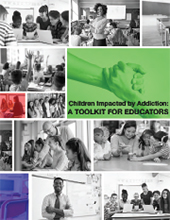
Click to download
SAMHSA Student Assistance: A Guide for School Administrators
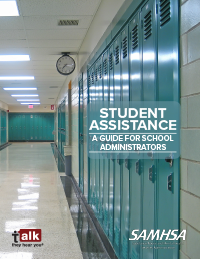
Click to download
Publication No. PEP19-PL-Guide-1 Rockville, MD: National Mental Health and Substance Use Policy Laboratory. Substance Abuse and Mental Health Services Administration, 2019.
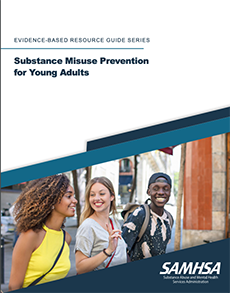
Click to download
Prevention Lead Organizations
Want to learn about prevention resources, trainings, and curricula for your school? Contact the Prevention Lead Organization for your county:
Region 1:
Brooke, Hancock, Marshall, Ohio, Wetzel
Contact:
Dara Pond
Youth Services System, Inc.
(304) 233-2045
dpond@ysswv.com
Region 2:
Berkeley, Grant, Hampshire, Hardy, Jefferson, Mineral, Morgan, Pendleton
Contact:
Barbra Masih MS, LPC, NCC, AADC, CRC, PSII
Potomac Highlands Guild
304-257-1155
barbiem@potomachighlandsguild.com
Region 3:
Calhoun, Jackson, Pleasants, Ritchie, Roane, Tyler, Wirt, Wood
Contact:
Alison Browning
Westbrook Health Services
304-927-5200
abrowning@westbrookhealth.com
Region 4:
Barbour, Braxton, Doddridge, Gilmer, Harrison, Lewis, Marion, Monongalia, Preston, Randolph, Taylor, Tucker, Upshur
Contact:
Elizabeth Shahan, MSW, LGSW, PSII
West Virginia Prevention Solutions
304-423-5049
Elizabeth@wvpreventionsolutions.org
Region 5:
Boone, Cabell, Clay, Kanawha, Lincoln, Logan, Mason, Mingo, Putnam, Wayne
Contact:
Kim Shoemake, MS
Prestera Center
304-412-7036
Kimberly.Shoemake@prestera.org
Region 6:
Fayette, Greenbrier, McDowell, Mercer, Monroe, Nicholas, Pocahontas, Raleigh, Summers, Webster, Wyoming
Contact:
Greg Puckett
Community Connections
304-913-4956
greg.puckett@strongcommunities.org
